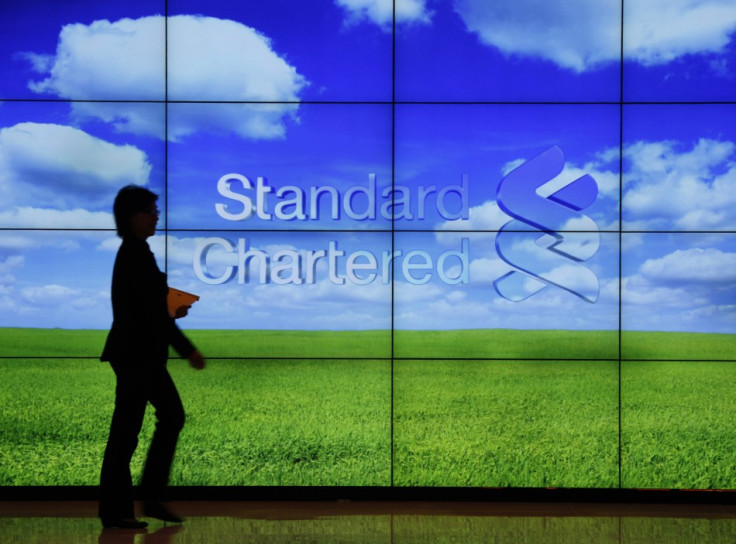Standard Chartered: Mervyn King Rebukes New York Regulator But Insists no 'Trade War'

Mervyn King insists there is no banking "trade war" between Britain and the United States but the Bank of England Governor did call for co-operation between US regulators as criticism of the unilateral attack on Standard Chartered by state authorities in New York continues to escalate.
Taking questions during a press conference in London Tuesday following the release of the Bank's quarterly inflation report, King said he hoped that US regulators would "work together" and refrain from making public statements about specific institutions before investigations are complete. He also refused to draw parallels between the on-going investigations into allegations of inter-bank interest rate rigging and the current probe into Standard Chartered, which only involve single regulator.
"It's very important for people to distinguish between these different episodes," said King. "In the Libor one, all the regulators involved, whether it be in the United States or the United Kingdom, produced coordinated publication of reports, which came out after the investigation was completed and they have made their judgements."
The comments are a veiled - yet potentially powerful - broadside to Benjamin Lawsky, the outspoken superintendent of New York's Department of Financial Services (DFS) who branded Standard Chartered a "rogue institution" and accused the bank of helping to helping to launder billions of dollars for clients in Iran who sought to avoid US led sanctions in a report released Monday. Market reaction to the charges, which could see the venerable 160-year old institution lose its New York banking licence, loped more than £8bn in value from its share price as the stock suffered a record plunge in London and Hong Kong.
The notable absence of support from Federal regulators - including the Treasury's Office of Foreign Assets Control (OFAC) - has infuriated some in Washington and London and suggests Lawsky's ambitions might run beyond his two-year old remit and complicate the further the global drive for consistent banking regulation.
Reuters has reported that US Treasury and Federal Reserve officials were "blindsided and angered" by Lawsky's unilateral attack on Standard Chartered and the emotive language it included. A statement issued by the bank Tuesday indicated it was also being investigated by the Federal Reserve Bank of New York, the Justice Department and the New York District Attorney's Office.
The move has also raised the ire of politicians in the United Kingdom, who feel British banks have been unfairly targeted by US authorities in the global effort to crack down on financial market malfeasance.
"I think it's a concerted effort that's been organized at the top of the US government," said John Mann, a British lawmaker who also sits on the UK House of Common's Treasury Select Committee and has a well-earned reputation for challenging bankers and the culture of the City. "This is Washington trying to win a commercial battle to have trading from London shifted to New York."
Standard Chartered has hit back hard at the colourful accusations in Lawsky's report, issuing a statement that it strongly rejected the DFS's version of events while revealing that its own investigation had uncovered issues of non-compliance and that is had voluntarily approached US officials in an effort to "self-report" suspected violations.
Lawsky's office, formed in late 2011 with the merger of the State's banking and insurance departments, is indeed impressive. The former state and federal prosecutor has oversight of more than 5,000 banks, brokerages and insurance firms with assets of more than $5.2tn under their control.
The seventeen year legal veteran has also earned his stripes under two of the state's most outspoken politicians: Governor Andrew Cuomo and Democratic Senator Charles Schumer, both of whom have made significant advances in their careers through aggressive and populist attacks on the financial industry. Schumer most recent made headlines by vowing to pursue the co-founder of Facebook, Eduardo Saverin, for capital gains taxes after the websites $100bn flotation, despite the fact that he gave up his US citizenship in 2009.
His "mission number one", at the DFS, he told the Buffalo News shortly after his appointment, is "to be the sort of financial services regulator that works closely with industries we regulate to really help them thrive and create jobs in New York State."
Others have suggested the motive could be one of narrow commercial interest. The online financial newspaper TheStreet.com says a 2006 study by the Federal Deposit Insurance Corp shows the state lost around 30 percent of its assessment revenue - the cash it gets from banks to maintain state charters - when JPMorgan and HSBC adopted national charters instead.
Bloomberg News reported that Standard Chartered may have to pay as much as $700m in fines to avoid losing its New York banking licence, based on the charges levied by Lawsky's office and the cash recently set aside by HSBC to satisfy the US Senate Committee on Banking's verdict that it allowed drug cartels and terrorist organizations access to the US financial system.
Standard Chartered shares have gained arodn 8.2 percent today in London, changing hands at 1,333 pence each, in an effort to pare back some of the 20 percent decline the stock suffered on Tuesday in its biggest single-day decline on record.
© Copyright IBTimes 2024. All rights reserved.





